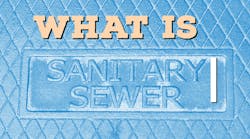MWH Soft, a provider of environmental and water resources applications software, announced the release of Comprehensive Handbook on Water Quality Analysis for Distribution Systems - a resource for anyone involved in the design, operation, protection, and maintenance of drinking water distribution systems.
From a basic overview of water quality issues and regulations to steady and dynamic water quality assessment, sophisticated water quality reactions, and reservoir and tank mixing, this authoritative textbook covers everything students, engineers, managers, health officials, water quality specialists, consultants, and researchers need to know to reliably construct, calibrate and use rigorous network models. These models are invaluable in enhancing and understanding the factors that affect water quality deterioration in distribution systems, predicting the effects of tanks and storage, determining disinfectant residual levels, estimating the effects of various treatment and delivery scenarios, developing sound improvement strategies, designing effective sampling programs, meeting environmental regulations, improving system management and operation, and protecting public health.
Written by world-renowned industry experts, Comprehensive Handbook on Water Quality Analysis for Distribution Systems offers the most extensive reference ever published on water quality transport and mixing in the distribution system environment. Featuring more than 100 solved problems, this working handbook for engineers, operators, regulators, students and practitioners provides an unprecedented educational experience on the critical topic of water distribution systems engineering and management. It covers theoretical scientific foundations, advanced technological issues, and real-world distribution systems water quality modeling applications supported by extensive exercises. This instructional book includes many worked-out examples with step-by-step guidance that walks readers through the complete modeling process from start to successful finish. The text details state-of-the-art water quality analysis techniques and explores the latest knowledge and technologies available, along with the detailed explanations needed to become a master modeler.
The unparalleled scope and specific focus of the book make it an essential addition to any reference library. Chapter-by-chapter coverage includes an overview of water quality issues; a summary of drinking water quality regulations; fundamentals of water quality transport, including reaction kinetics; tanks and reservoirs mixing, including compartment and computational fluid dynamics (hydrodynamic) modeling; steady state and dynamic water quality simulation methods; developing and calibrating a water quality model; and modeling applications.
"Combining theory with hands-on applications, Comprehensive Handbook on Water Quality Analysis for Distribution Systems features the most complete and up-to-date information about modeling and improving water quality in water distribution piping systems available. It offers an enriching educational experience even to readers new to the water industry," said Paul F. Boulos, Ph.D, president and chief operating officer of MWH Soft and an author of the book. "It's filled with solved problems and practical guidance to help water industry professionals design, maintain and operate safe, reliable water systems and continue to earn the public trust."
"This textbook presents the latest knowledge in the field of distribution system water quality modeling methodologies," said J. Erick Heath, PE, vice president of sales and client relations at MWH Soft. "Strong emphasis has been placed on not only understanding the methods by which results are computed, but on applying the models to real problems and using the knowledge gained to formulate system models, identify input parameters, and interpret model results. This knowledge will prove invaluable to water utilities in securing their systems against accidental/planned contaminations from backflow events and terrorist attacks."
The book is already receiving accolades from the waterworks industry. "Comprehensive Handbook on Water Quality Analysis for Distribution Systems is a single reference offering a comprehensive review of the principles, phenomenon and current trends in the operation of treated water distribution systems," said Nathan O. Walker, hydraulic modeling specialist for HDR Inc., in Denver, Colo. "The text will be of value to students, engineers, distribution system managers and operators."
Source: MWH Soft

